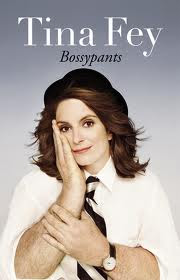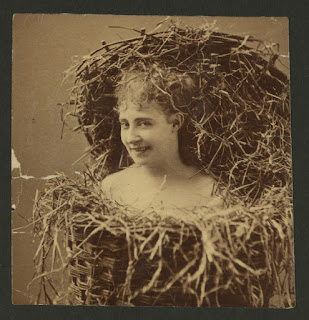By Contributor Barbara Holm
I love books so much that, when I was a kid, the only thing I wanted more than “to be a Monty Python” (Source: Me, Age ten) was to work at a bookstore. Funny books are usually my favorite, because I am a human and humans like laughing. Here are just a few of my favorite books by women in comedy:
***
 Is Everyone Hanging Out Without Me? (And Other Concerns) by Mindy Kaling
Is Everyone Hanging Out Without Me? (And Other Concerns) by Mindy KalingA few weeks ago someone asked me what my favorite book was, and I said it was this one without hesitation. My friend said, "That doesn’t count because your favorite book is always the last book you’ve read." However, I have since read a few books and this is still my favorite! It's a charming collection of essays ranging stylistically from true-life memoir stories to adorable anecdotes and lists.
I identified with a lot of the awkward stories of her childhood and was inspired by her work ethic. My favorite part was when she discussed writing the Off-Broadway play Matt and Ben, which turned out to be the door that led to The Office. I think this chapter humbly downplays how talented, creative, and driven she and her friend were to write, produce, direct, promote and star in a comedy play. Mindy writes, “Because no one would hire us to act or write, Brenda and I decided to create something to perform in ourselves.” It also showed me that if you have a dream (for example, to write for TV), don't wait for the dream job to fall in your lap, start working at it now, because if you don't, it might never happen.
***
 Bossypants by Tina Fey
Bossypants by Tina Fey I've read a few books about SNL and a many that were autobiographies of comedians, but few that were this laugh out loud funny, thoughtful and charismatic. The different stories weave together to depict the amazing life of a woman who is passionate, ambitious, strong and hilarious.
My favorite part of the book was the chapter "I don't care if you like it." The story is about Jimmy Fallon telling Amy Poehler one of her jokes wasn't "cute," and she said, "I don't fucking care if you like it." Fey says this embodies her outlook on sexism in comedy: If old, unfunny men tell the media that women aren't funny, she doesn’t care if they like it. Fey writes, "Is this person in between me and what I want to do? If the answer is no, ignore it and move on." It’s wonderful advice for anyone (not just women) in an artistic profession.
***
 I Don't Care About Your Band: What I Learned from Indie Rockers, Trust Funders, Pornographers, Faux-Sensitive Hipsters, and Other Guys I've Dated by Julie Klausner
I Don't Care About Your Band: What I Learned from Indie Rockers, Trust Funders, Pornographers, Faux-Sensitive Hipsters, and Other Guys I've Dated by Julie Klausner This dating memoir cracked me up, and I'm usually bored by dating memoirs. The stories are as ridiculous, loud and funny as Julie Klausner herself. While I don't take everything she preaches as gospel, I love the main theme of the book. Throughout so many dating horror stories, Klausner consistently insists that women should be confident, strong and not bend to a man's wishes. She encourages against girls who infantalize themselves for men, and girls like Miss Piggy who beg and plead for an indifferent Kermit. It’s a fast, funny read calling on women to unabashedly be themselves. (Klausner is a WICF alumna).
***
 I Totally Meant to Do That by Jane Borden
I Totally Meant to Do That by Jane Borden I had the pleasure of meeting Jane Borden (a Women in Comedy Festival alumna!) a few times, and I always thought she was genuinely kind and I really liked her. When her book came out, my admiration grew into: “holy crap this girl is funny and awesome.” The book is a collection of memoir-style stories about a southern girl moving to New York. It’s hilarious and well written, with a distinct voice. “I totally meant to do that” is charming and quirky and reminds me of David Sedaris, or a happier Augusten Burroughs.
***
 The Bedwetter: Stories of Courage, Redemption, and Pee by Sarah Silverman
The Bedwetter: Stories of Courage, Redemption, and Pee by Sarah SilvermanI didn't expect this book to affect me the way it did. Sarah's stand-up is slightly impersonal, fiction-based and relies on a character. So when I picked up her book to casually browse through it, I was surprised when a full hour later I was fully engrossed and so touched I was fighting back tears. While hilarious, the memoir is nakedly sincere and honest, employing a courage that many comedy books lack. I loved learning about her early forays into stand-up and was impressed with the way she threw herself wholeheartedly into the craft at a young age. One part I liked was the chapter "Make it a treat," where Sarah says if something is incredibly special she tries not to overuse it, which is a strategy I then applied to my own comedy writing.
***
All of these books are wonderful and changed my life in tiny ways through giving me comedy or life advice. I think it’s important as an artist to read as much as possible, to fill oneself with creative input. More than anything, reading all these hilarious books by women just inspires me to one day hope to write my own. Barbara Holm is a stand-up comedian from Seattle, Washington. She has performed at Bridgetown Comedy Festival, The Women in Comedy Festival, and Bumbershoot Festival. She has been described as clever, creative and unique.
Barbara Holm is a stand-up comedian from Seattle, Washington. She has performed at Bridgetown Comedy Festival, The Women in Comedy Festival, and Bumbershoot Festival. She has been described as clever, creative and unique.












